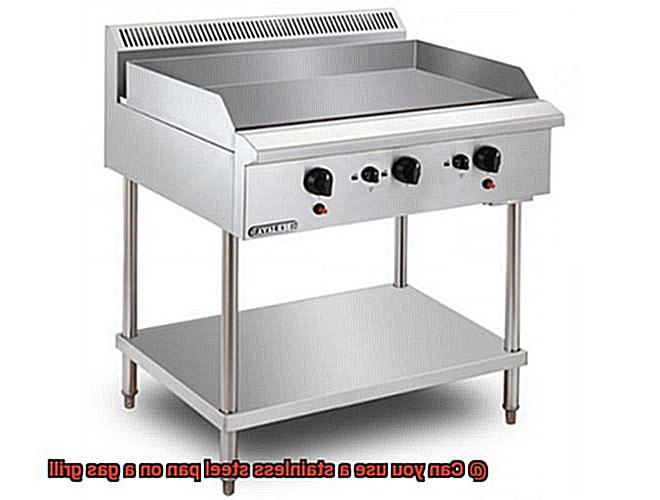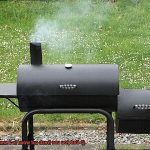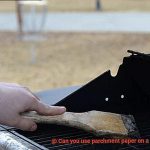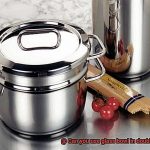Do you feel like your gas grill is limiting your cooking options? Are you ready to break free from the constraints of traditional grilling and try something new? Look no further than a stainless steel pan.
Stainless steel pans are not only durable and versatile in the kitchen, but they also have a place on your gas grill. Many people are hesitant to use them on the grill due to concerns about heat damage, but fear not. You can safely use a stainless steel pan on a gas grill and open up a whole world of delicious possibilities.
In this blog post, we’ll explore the benefits of using a stainless steel pan on your gas grill. We’ll cover which types of pans work best, different cooking methods to try, and tips for cleaning and maintenance.
So grab yourself a cold drink, kick back, and get ready to elevate your grilling game with a trusty stainless steel pan. Your taste buds (and dinner guests) won’t know what hit them.
Contents
Benefits of Using a Stainless Steel Pan on a Gas Grill
If you’re looking for a way to elevate your grilling game, using a stainless steel pan on your gas grill is a must-try. Not only does it offer several benefits that make it a popular choice among grill masters, but it also provides an eco-friendly option to reduce waste.
One of the main advantages of using a stainless steel pan on a gas grill is its ability to conduct heat evenly. With excellent heat conductivity, you can rest assured that your food will cook evenly without any hot spots or cold areas. Whether you’re grilling up some juicy steaks, crisp vegetables, or even a homemade pizza, a stainless steel pan can help you achieve perfectly cooked dishes every time.
But wait, there’s more. Stainless steel pans are also incredibly durable and robust. They can withstand high temperatures without warping or cracking, making them ideal for grilling. Plus, they are resistant to rust and corrosion, ensuring that you can use them repeatedly without worrying about them deteriorating quickly.
Cleaning up after grilling is effortless with stainless steel pans. Unlike other materials that absorb flavors and odors from food, stainless steel pans do not. This means that you can use them for cooking different types of dishes without worrying about cross-contamination. Additionally, they are dishwasher safe, making cleaning up a breeze.
Using a stainless steel pan on your gas grill is also an eco-friendly option that helps reduce waste. Instead of using disposable aluminum foil or paper plates, you can use a stainless steel pan repeatedly, minimizing the amount of waste generated during the grilling process.
When using a stainless steel pan on your gas grill, choosing the right size and shape is crucial. A pan that is too small may not distribute heat evenly, while one that is too large may not fit properly on the grill grates. It’s recommended to choose a pan with high sides to prevent food from spilling over and causing flare-ups.
Choosing the Right Size and Type of Stainless Steel Pan for Your Gas Grill
Adding a stainless steel pan to your gas grill is a great way to cook a variety of foods. However, choosing the right size and type of pan is crucial for optimal results.
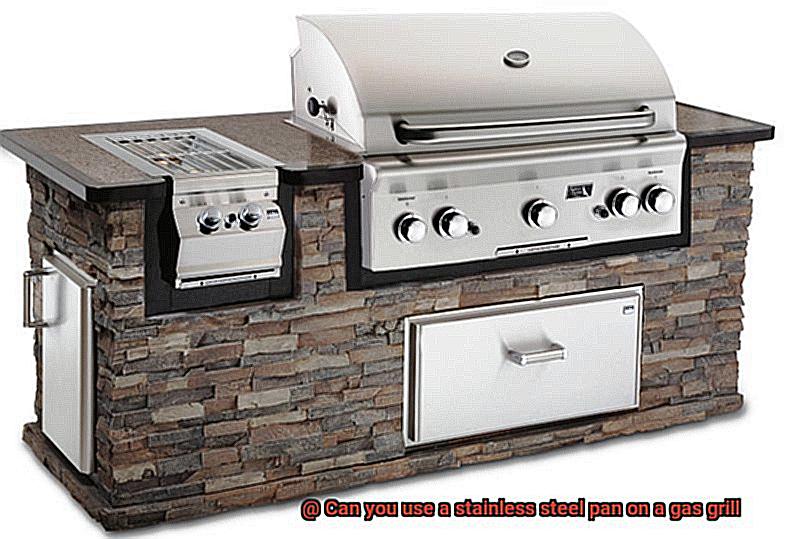
Size Matters
The size of the pan is an essential factor to consider before making a purchase. You want a pan that fits comfortably on the grill grates without touching the sides or the lid of the grill. Consider the amount of food you plan to cook and the size of your grill to determine the right size.
Type of Pan
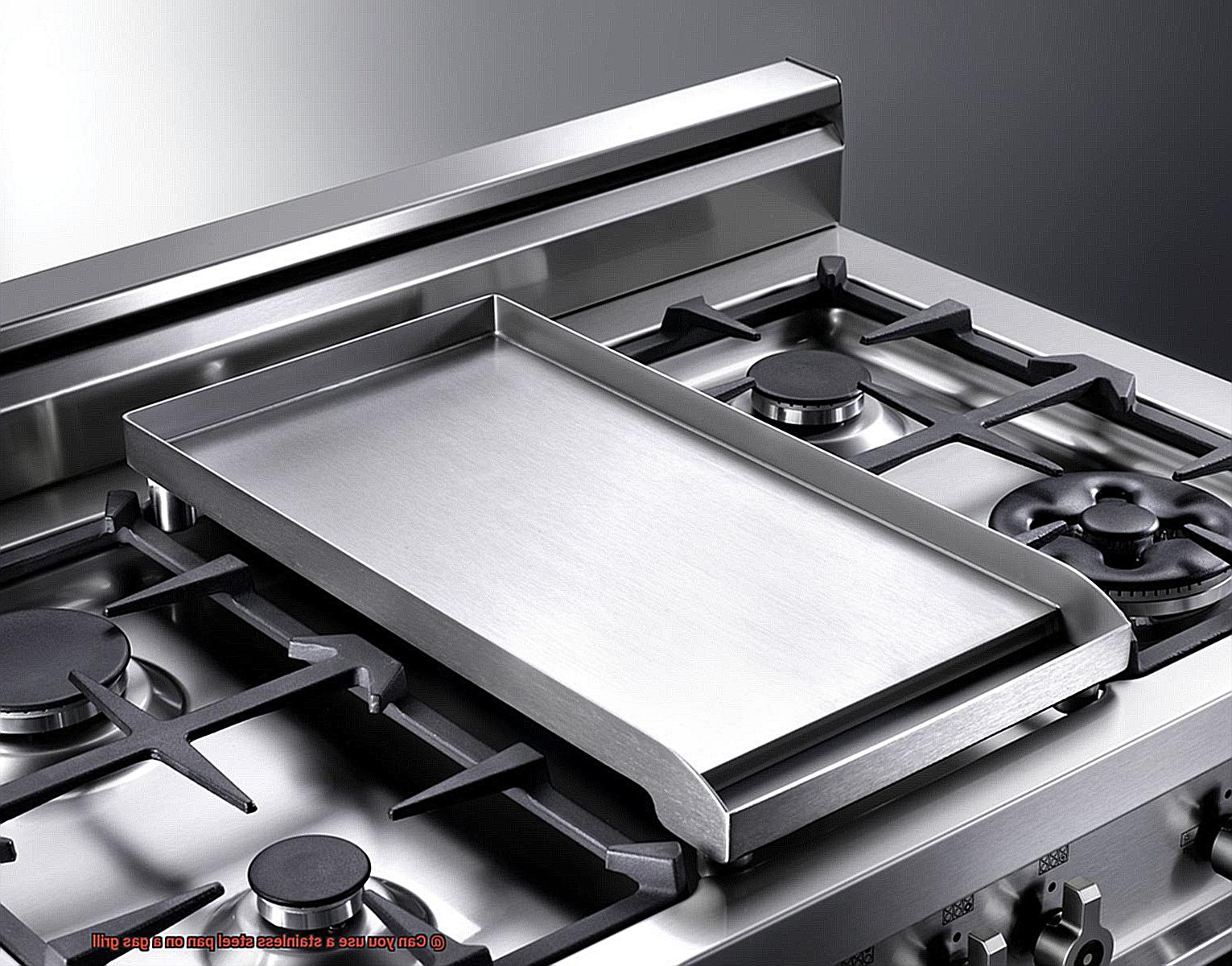
Choosing the right type of stainless steel pan is also important. Opt for a pan made explicitly for grilling, with thicker gauge stainless steel and higher sides to prevent food from falling off. Look for pans with non-stick coatings or seasoned surfaces to prevent sticking.
Perforated or Solid
Decide whether you want a perforated or solid pan. Perforated pans are ideal for grilling vegetables, allowing heat and smoke to circulate evenly. Solid pans are better for delicate items like fish or eggs that may break apart on a perforated surface.
Handle Design
Don’t overlook the handle design when selecting your pan. It’s crucial to choose a pan with sturdy handles that can withstand high heat, made from heat-resistant materials like silicone or stainless steel. Ensure that the handles are securely attached to the pan to avoid any accidents.
Preheating the Grill and Placing the Pan On the Grates
If you’re looking to create delicious meals using a stainless steel pan on your gas grill, it’s important to know how to properly preheat the grill and place the pan on the grates. Here are some tips to help you get started:
Preheating the Grill
To ensure your food cooks evenly, preheating the grill is crucial. Turn on all of the burners and close the lid, allowing the grill to heat up for 10-15 minutes. This will make sure that the grill grates are hot and ready for your pan.
Placing the Pan on the Grates
Once your grill is preheated, it’s time to place your pan on the grates. First, center it on the grates and check that it’s stable so it won’t tip over. You can use a pair of tongs or a spatula to hold it in place if needed. It’s also important to use a pan with heat-resistant handles for easy movement.
Heating Up the Pan
After placing your pan on the grates, close the lid and let it heat up for a few minutes. This allows for even heating throughout the pan before adding any food. This step ensures that your ingredients will cook properly.
Cooking with Your Pan
When you’re ready to cook, add your ingredients and start cooking as you would on a stove-top. However, keep in mind that cooking times and temperatures may vary from what you’re used to. Grills tend to cook hotter than stovetops, so it’s essential to keep an eye on your food and adjust as necessary.
Cooking with a Stainless Steel Pan on a Gas Grill
Look no further than cooking with a stainless steel pan on your gas grill. With the right techniques and tools, you can expand your grilling repertoire and create restaurant-quality meals in the comfort of your own backyard.
The first key to success is choosing the right type of pan. Opt for a high-quality stainless steel pan that has a thick bottom, which will evenly distribute heat and minimize hot spots. Before using the pan on the grill, it’s crucial to season it properly. Simply heat the pan on the grill until it’s hot, add a small amount of oil, and rub it all over the surface of the pan. This will create a non-stick surface that will prevent food from sticking and make clean-up a breeze.
When you’re ready to start cooking, ensure that both your grill and pan are preheated before adding any food. This step is important to guarantee even cooking and prevent sticking. Use the right cooking techniques, such as using tongs or heat-resistant plastic utensils instead of metal ones, to avoid scratching the surface of the pan. Additionally, steer clear of overcrowding the pan to prevent steaming instead of searing.
Finally, keep a close eye on the temperature throughout the cooking process. Stainless steel pans can get very hot, so be mindful of adjusting the heat as needed to prevent burning or overcooking.
Cleaning and Maintaining Your Stainless Steel Pan
The good news is that cleaning and maintaining your stainless steel pan is easy if you follow a few simple tips.
Let’s start with cleaning. After each use, wash your pan with warm water and soap using a soft sponge or cloth. Abrasive sponges or cleaners can scratch the surface of your pan, so avoid them at all costs. For stubborn stains or burnt-on residue, try soaking your pan in a mixture of warm water and vinegar or baking soda for a few hours before cleaning it again.
Once your pan is free of food residue, make sure to dry it thoroughly to prevent water spots and rust. Applying a thin layer of oil to the surface of the pan after cleaning can also help protect it from rust and other damage.
In addition to regular cleaning, proper maintenance is crucial for keeping your stainless steel pan in top condition. Avoid stacking heavy pans on top of each other as this can damage the surface of the pan. Instead, store your pan in a dry, cool place where it won’t be exposed to moisture or extreme temperatures.
To summarize, here are some key tips for cleaning and maintaining your stainless steel pan:
- Wash your pan with warm water and soap using a soft sponge or cloth
- Avoid abrasive sponges or cleaners that can scratch the surface
- Soak stubborn stains in a mixture of warm water and vinegar or baking soda
- Dry your pan thoroughly to prevent water spots and rust
- Apply a thin layer of oil to protect your pan from rust and other damage
- Store your pan in a dry, cool place where it won’t be exposed to moisture or extreme temperatures
Tips for Using a Stainless Steel Pan on a Gas Grill
Grilling is a favorite pastime for many, but certain foods can be challenging to cook directly on the grill grates. That’s where using a stainless steel pan on a gas grill comes in handy. Here are some tips to ensure that your food cooks evenly and doesn’t stick to the pan.
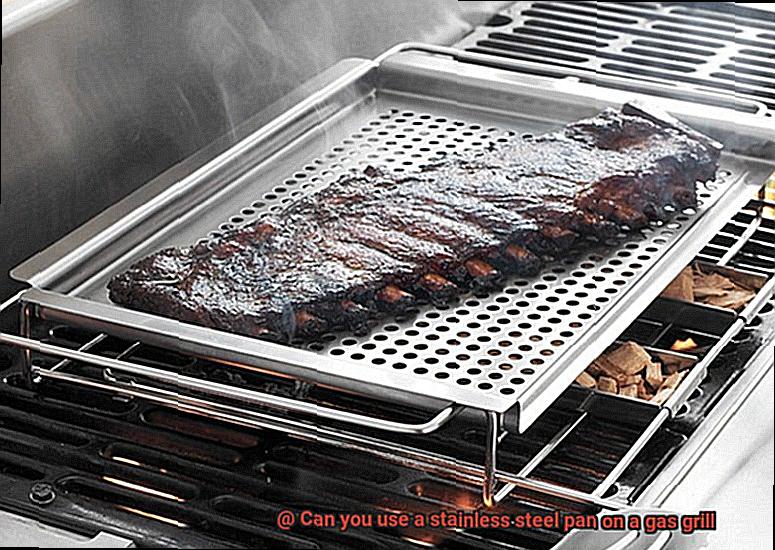
Choose the Right Pan
The quality of your pan is essential when using a stainless steel pan on a gas grill. Look for a pan with a thick, heavy bottom and sturdy handles that can withstand high heat and the weight of your food. A pan that is too small may not distribute heat uniformly, while a pan that is too large may not fit adequately on the grill grates.
Preheat Your Grill and Pan
Before placing your stainless steel pan on the grill, preheat it thoroughly. Preheating helps prevent sticking and ensures even cooking. To preheat your pan, place it on the grill grates for several minutes before adding your food. It’s also important to preheat your grill before adding your pan.
Oil Your Pan
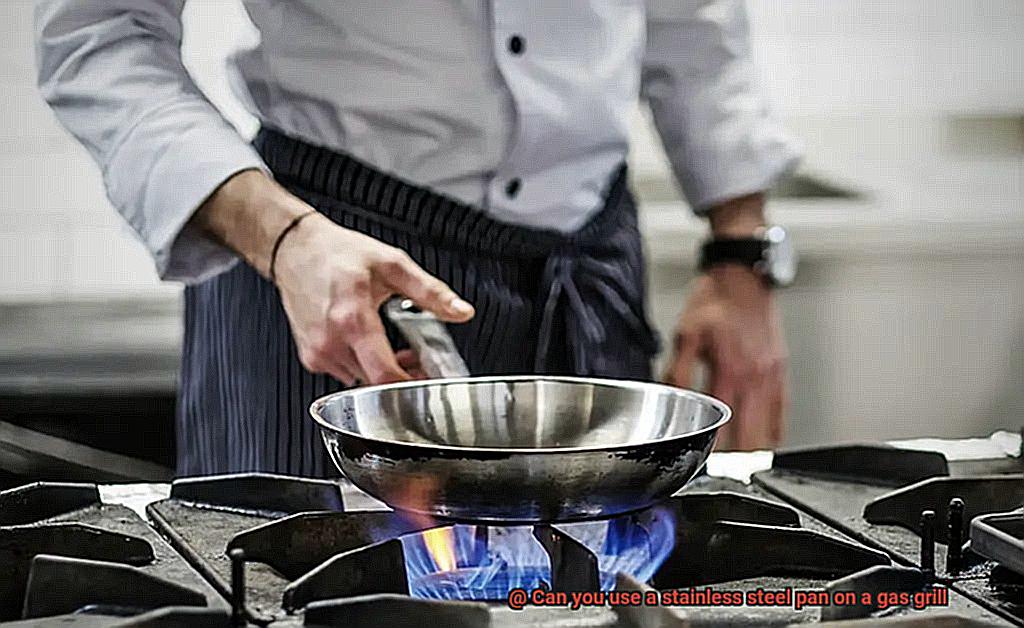
Preventing sticking is crucial when using a stainless steel pan on a gas grill. To achieve this, oil your stainless steel pan before adding food. Use a high smoke point oil like canola or vegetable oil to prevent burning. Be sure to coat the bottom of the pan evenly with oil before adding your food.
Avoid Overcrowding Your Pan
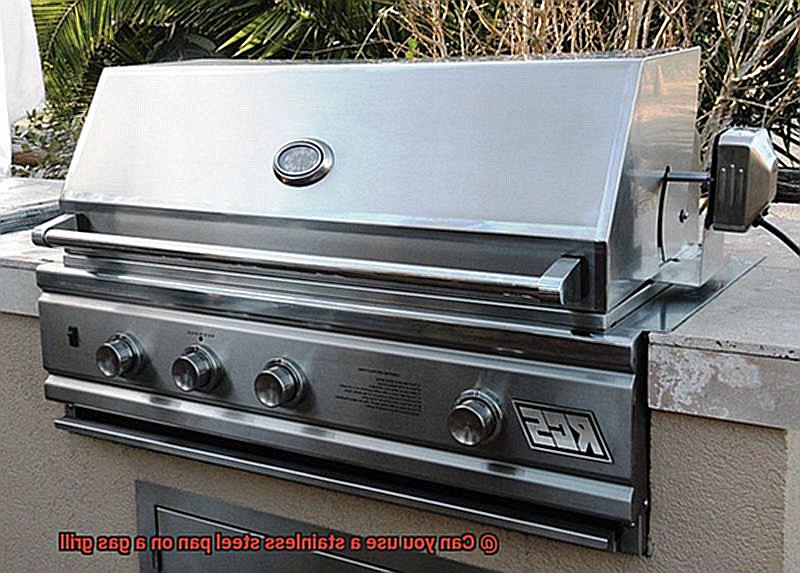
Overcrowding your pan is a common mistake when cooking with a stainless steel pan on a gas grill. Too much food in the pan can cause the temperature of the pan to drop, resulting in uneven cooking and potential sticking. Instead, work in batches if necessary and leave plenty of space between each piece of food.
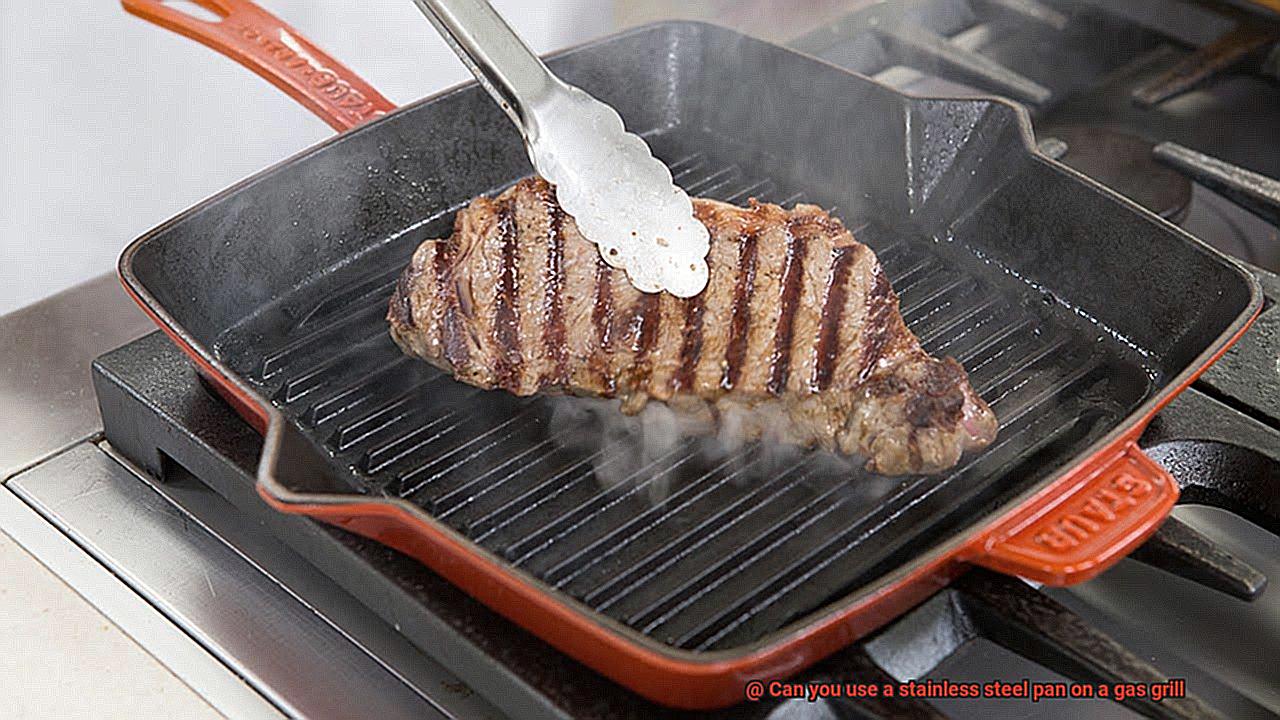
Monitor the Heat
Stainless steel heats up quickly, so it’s essential to monitor the temperature and adjust the flame accordingly. If the temperature gets too high, your food may burn, while if it’s too low, your food may stick to the pan. Keep an eye on the temperature and adjust the grill’s flame accordingly.
Handle with Care
When you’re finished cooking, it’s critical to remove your stainless steel pan from the grill carefully. Use oven mitts or potholders, as the pan will be extremely hot and can cause serious burns if mishandled.
Advantages of Using a Stainless Steel Pan on an Electric or Charcoal Grill
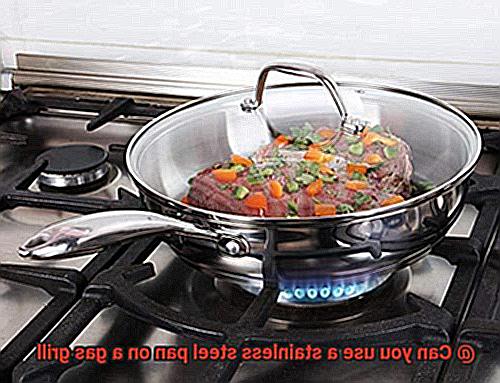
Stainless steel is the ideal material for grilling. It’s incredibly durable and can withstand high temperatures, ensuring your meats and veggies are cooked to perfection every time. Not only that, but stainless steel pans heat up quickly and evenly, making them a reliable choice for any grilling occasion.
But the benefits don’t stop there. Stainless steel pans are also non-reactive, which means they won’t react with acidic foods like tomatoes or citrus fruits. This makes them perfect for cooking delicate proteins like fish and vegetables, as well as a wide variety of other foods.
Cleaning and maintaining stainless steel pans is a breeze. They’re dishwasher safe and can be easily scrubbed with soap and water to remove any leftover food residue. Plus, since stainless steel is non-porous, it’s resistant to bacteria and other harmful microorganisms, making it a safe and hygienic option for cooking.
Finally, stainless steel pans are incredibly versatile. You can use them on electric or gas stovetops, in the oven, or even on a campfire. This makes them an excellent investment for any home cook or grill enthusiast looking for a durable and practical cookware option.
Common Mistakes to Avoid When Using A Stainless Steel Pan On A Gas Grill
Using a stainless steel pan on your gas grill is a great way to cook up delicious meals with perfect sear marks. But before you get started, there are some common mistakes you should avoid to ensure that your culinary creations turn out perfectly every time.
Firstly, make sure to properly preheat your pan. Preheating is essential to ensure that your food cooks evenly and doesn’t stick. So, be sure to preheat your stainless steel pan for at least 5-10 minutes before placing it on the grill. This will also help prevent hot spots on the pan.
Another mistake to avoid is using too high of heat. While stainless steel is an excellent conductor of heat, it’s important to use the right temperature for the food you’re cooking. Too high of heat can cause your food to burn or stick to the pan, while too low of heat can result in undercooked or unevenly cooked food. So, start with medium heat and adjust accordingly based on what you’re cooking.
It’s also essential to properly oil your pan before cooking. Even though stainless steel is known for being non-stick, adding a layer of oil before cooking ensures that your food doesn’t stick. Use any type of cooking oil, but make sure it has a high smoke point like vegetable or canola oil. This will prevent the oil from burning and leaving a residue on the pan.
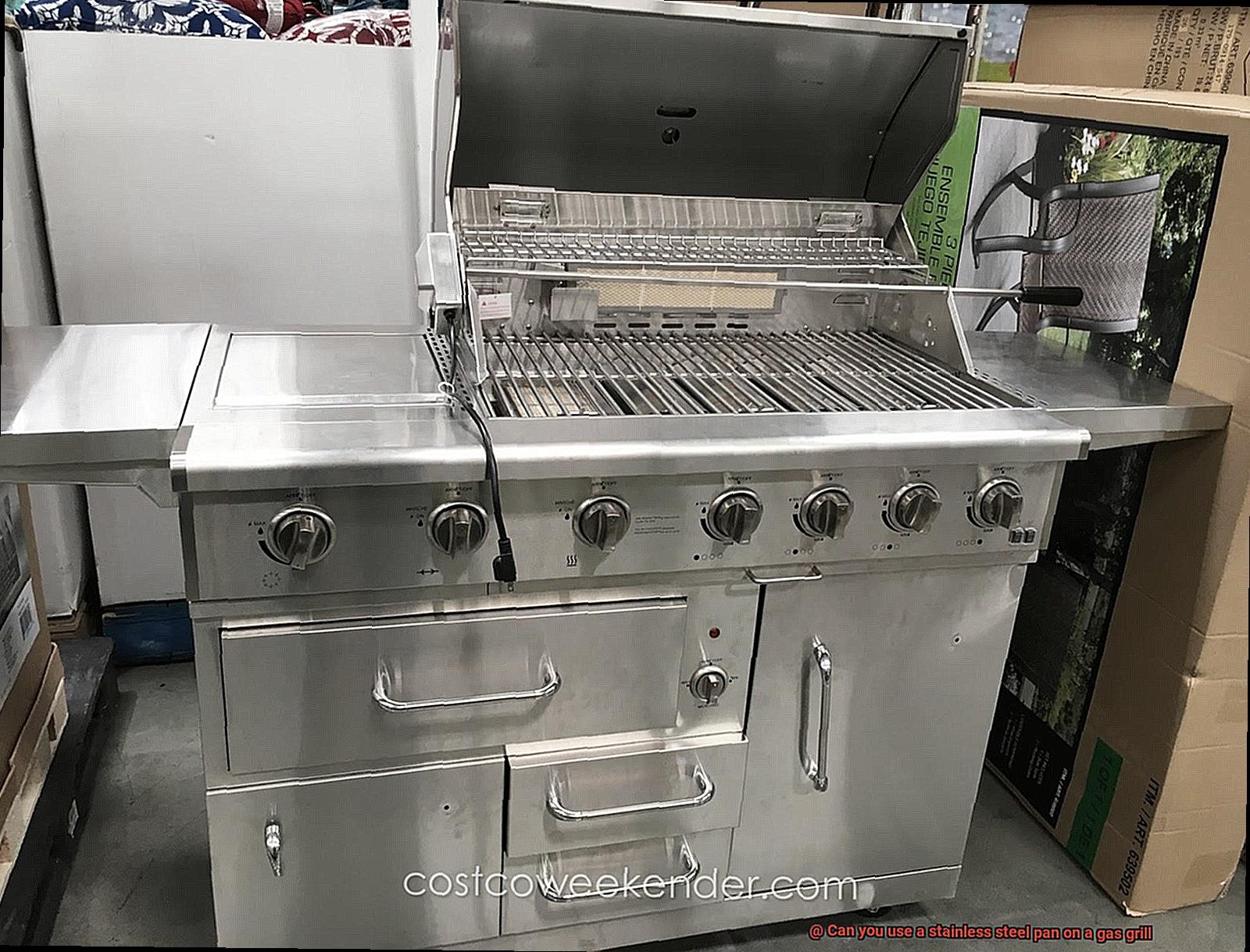
When it comes to cleaning your pan, don’t forget to do it properly after use. Not cleaning it thoroughly can lead to rust and corrosion over time. So, clean it with warm soapy water and a soft sponge after each use. Avoid using abrasive cleaners or scrubbers as they can scratch the surface of the pan and cause damage.
To sum up, here are the common mistakes you should avoid when using a stainless steel pan on a gas grill:
- Not properly preheating the pan
- Using too high of heat
- Not properly oiling the pan before cooking
- Not cleaning the pan properly after use
Also Read: Can You Brine in a Metal Pot?
Conclusion
In summary, using a stainless steel pan on your gas grill is a surefire way to take your grilling game to new heights and whip up mouth-watering meals with perfect sear marks. The advantages of opting for a stainless steel pan are aplenty, from its superior heat conductivity and durability to rust and corrosion resistance, easy cleaning, and eco-friendliness.
When selecting the ideal size and type of stainless steel pan for your gas grill, factor in the quantity of food you plan to cook and the size of your grill. Additionally, it’s critical to preheat both your grill and pan adequately before cooking while also oiling it beforehand to prevent sticking.
To avoid common blunders when using a stainless steel pan on a gas grill, make certain that you preheat the pan properly, use the right temperature for what you’re cooking, oil it before cooking, and clean it thoroughly after use.
All things considered, incorporating a stainless steel pan into your grilling routine opens up limitless possibilities for crafting restaurant-quality meals in the comfort of your backyard.
You may also like:








